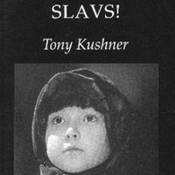
Overview
Synopsis
Tony Kushner’s 1994 play Slavs! paints a darkly comical picture of the USSR as it crumbles in the mid-1980s through its later rebirth as a collection of independent states. Aleksii Antedilluvianovich Prelapsarianov, the world’s oldest living Bolshevik, addresses the Hall of the Soviets in 1985 on the dangers of entering a new era without first devising a system of order, or “great theory”, to guide the nation through the ensuing chaos. Along with his elderly comrades, they discuss how to rebuild life within a system, which once based on ideals, has now collapsed. The play then moves to focus on the victims of this collapse, led by a young, alcoholic lesbian, Katherina, and her lover Bonfila, a pediatrician exiled to Siberia after their relationship is discovered. There, Bonfila hopelessly struggles to treat the huge numbers of children made mute and zombie-like by the poisoning from nuclear waste. Metaphysical, personal, and political, Kushner’s follow up to Angels in America, Slavs! remains faithful to its subtitle: "Thinking About the Longstanding Problems of Virtue and Happiness".
Show Information
Context
Plot
Characters
| Name | Part Size | Gender | Vocal Part |
|---|---|---|---|
|
Lead |
Male |
Non-singer |
|
|
Lead |
Female |
Non-singer |
|
|
Lead |
Female |
Non-singer |
|
|
Supporting |
Male |
Non-singer |
|
|
Supporting |
Male |
Non-singer |
|
|
Supporting |
Female |
Non-singer |
|
|
Featured |
Female |
Non-singer |
|
|
Featured |
Female |
Non-singer |
|
|
Featured |
Male |
Non-singer |
|
|
Featured |
Male |
Non-singer |
|
|
Featured |
Female |
Non-singer |
|
|
Featured |
Female |
Non-singer |
Songs
A song with an asterisk (*) before the title indicates a dance number; a character listed in a song with an asterisk (*) by the character's name indicates that the character exclusively serves as a dancer in this song, which is sung by other characters.
Monologues
Scenes
Key Terms
A loyal member of a communist bureaucracy, often portrayed as a symbol of systemic conformity in political theatre.
A member of the Russian revolutionary movement, sometimes portrayed in political or historical dramas.
A political ideology often depicted or explored in 20th-century epic or protest theatre for social critique.
The executive committee of communist parties, dramatized in theatre to explore authoritarianism and ideological control.
The former Soviet Union, frequently depicted in historical or epic plays focusing on communism, oppression, and revolution.
Videos
Sorry! We do not currently have videos for this guide.
Quizzes
Themes, Symbols & Motifs
Sorry! We do not currently have learning modules for this guide.
Quote Analysis
Sorry! We do not currently have learning modules for this guide.
